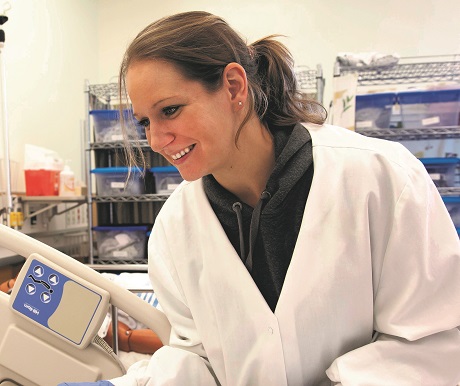The Fine Art of Basic Care
Nursing assistant program at COCC provides a well-rounded approach to the health care field
Up on the third floor of Central Oregon Community College’s (COCC) Health Careers
Center—a glassy, sophisticated facility that punctuates the center of the Bend campus—students
of the nursing assistant program are spending part of their day focusing on feet.
Lots of feet.
“It looks like a big spa day in here,” laughed Kari McDaniel, nursing assistant program
director, as students practice the essentials of caring for bedbound patients by working
on each other, learning the importance of connecting with a patient as they provide
nail care. “More than half our skills they do on each other,” explained McDaniel,
who oversees the college’s two levels of certified nursing assistant (CNA) training.
In Oregon, Level 1 CNA certification yields a skill set where nursing assistants can perform daily care essentials, from moving patients to feeding them to dressing them. They learn to monitor vitals, manage catheters and work in close concert with nurses. Level 2 training expands on these abilities and incorporates things like IV removal, blood sugar monitoring and a thorough understanding of communicating with patients with dementia.
Certification for Level 1 requires passing a state exam and the training—at both intervals—is a good way for students to not only master basic care concepts, but to also test the waters for a more immersive health care career, such as nursing.
Students work in mockup hospital rooms, where the detailed layout makes for an authentic experience. Stoic mannequins, tucked into beds, help to set the stage. “It’s set up to simulate the hospital environment and allows students to practice in a safe space while getting a feel for the actual setting,” said Mary LeLouis, a Level 2 instructor in the program.
“Probably two-thirds to three-quarters go on (beyond CNA training),” McDaniel said
of her students. “I don’t know that it’s necessarily into nursing, but definitely
in the health care field.”
In fact, a recent redesign to the nursing program at the college now has students
achieving their CNA certifications in their first year of becoming nurses, underscoring
how essential the skills are. Kelly Soto, a new RN who just went through the COCC
program, said that she learned a great deal from CNAs during her capstone clinical
experience. “I spent my time on the surgical floor of St. Charles-Bend with an amazing
group of nurses and CNAs who truly supported and encouraged me,” she said.
The CNA levels take just one term to complete, which means that Level 1-certified
individuals—with no prior experience—can jump into the workforce after just mere weeks
of schooling. Earning COCC’s well-rounded nursing assistant certificate, however,
takes a three-term commitment and wraps in subjects like health psychology and interpersonal
communication.
While the nursing assistant program at COCC is a relatively fast way to launch into
the field, the skills that students learn are as much about empathy and compassion
as they are about heavy lifting and hard work—strong ingredients for any health career.
They learn how to communicate with patients and how to create positive interactions
with folks facing tough situations. It’s challenging stuff, but full of rewards.
And it’s a fast-growing part of the health care spectrum. The U.S. Bureau of Labor
Statistics has forecast an 11 percent growth rate for the nursing assistant sector
between 2016 and 2026, a response to the vast boomer population that’s steadily arriving
in its golden years. More and more, CNAs are in demand.
To further address this need and help train more caregivers, the college recently
entered into a nursing assistant program partnership with Redmond’s Ridgeview High.
Approximately 20 students are completing the program each year, developing job skills
while their credits apply to high school requirements. McDaniel hopes to create the
same arrangement with other high schools.
CNAs work in settings like hospitals, long-term care and home health. Locally, program
grads are finding work with employers like St. Charles Health System, Bend Transitional
Care and Regency Pacific Management. And whether they build meaningful careers within
the CNA specialty or expand on their training and use it as a segue into other health
care fields, the start that students get at COCC orients them with both confidence
and capability for the path ahead.
For more details, see the Nursing Assistant program at COCC or call 541-383-7700.
By Mark Russell Johnson, COCC College Relations

